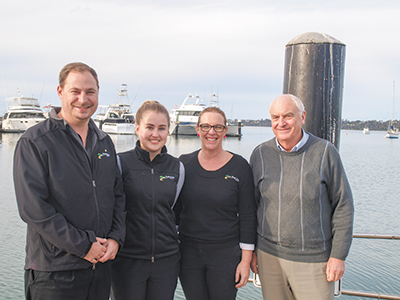The Building Services Unit at Tasmania’s Break O’Day Council is delivering award-winning, customer-focused service and reshaping the public opinion of Building Inspectors.
Located on the east coast of Tasmania, Break O’Day Council includes the beautiful pastures and forests of Fingal and the Blue Tier, as well as the iconic coastline of the Bay of Fires.
The area has a permanent population of 6500, but this swells to over 15,000 in the summer months.
The Council’s Building Services Unit consists of 3.5 full-time equivalent employees and is responsible for providing Building Surveying Services, Plumbing Surveying, Compliance, Building/Plum-bing Authority Services, Asset Management and Building Capital works programs.
The Unit has been nominated as LG Focus ‘High Achievers’ by Break O’Day General Manager, John Brown, who noted the team’s success in incorporating a customer service focus in to building.
Building Services Coordinator, Jake Ihnen, said this is an important focus at Council.
“Customer Service is a strategic focus of Council and we aim to deliver excellent service to the community.
“The Building Services team has extended their efforts in this regard by providing the best possible service to the community and being proactive and streamlined in our approach to developers.”
Some initiatives the team have introduced include: holding information sessions on changes to the New Building Regulatory framework for stakeholders in the construction industry; moving to electronic processing of applications; providing an exceptional service to developers and applicants by providing the required information for building and plumbing approvals; and meeting statutory deadlines on 100 per cent of all building and plumbing applications.
An Operation Structure Review was also undertaken to identify efficiencies and improvements to departmental operations.
Alongside Mr Ihnen, the Unit consists of Development Services Administration Officer Samantha Bates, Technical Officer Development Services Cathy Bailey and Project Officer Stuart Barwick.
Mr Ihnen said the Unit provides many years of local government experience and works cohesively as a team.
“Our holistic knowledge of planning and other Council approval processes means that we can work collaboratively with all Council departments so that team members can provide advice, which is inclusive of all departmental requirements of Council.
“Our team adapts well to new systems and processes and all team members are happy to adapt and listen to others.
“Our culture is to ensure we are all working in a team environment and everyone has equal input into decision-making processes.”
Another focus is working to redefine public perceptions.
“Our team is always working to revolutionise the way in which building inspectors are portrayed by providing a higher level of customer service focusing on Council’s role as a ‘Building Surveyor’,” Mr Ihnen said.
For their outstanding efforts, the Unit recently took home the State award from the Australian Institute of Building Surveyors (AIBS) for the Building Surveying Team of the year.
“Whilst we are very proud of the service we deliver, it was especially rewarding to receive this award, which was judged against other Private Building Surveying businesses,” Mr Ihnen said.
“[The win] means as much to the Council and the reputation with the public and ratepayers as it does to the team.
“Ratepayers can trust that they are receiving value for money whilst maintaining an exceptional service.”
Successful project management is also a key role of the team and this has recently included: project management of the newly constructed Bendigo BOCS (Break O Day Multi-Purpose Indoor Stadium) valued at $2.2 million; a roll-out of Councils Public Amenities Replacement program; and implementation of ‘Pay as you go’ public showering facilities and new street furniture design work.
Mr Ihnen said a major challenge the team faces is the introduction of the New Building Regulatory framework.
“These major changes will put substantial amounts of internal pressure on staff to adapt to new processes and systems to enable us to maintain our high level of service and professionalism.
“Some interesting challenges lie ahead for Local Government, including finding ways to adapt to new technologies and
potential amalgamations.”

















